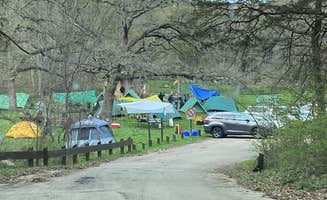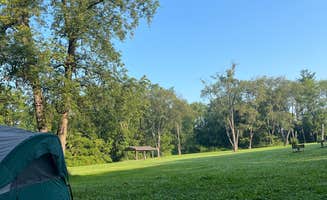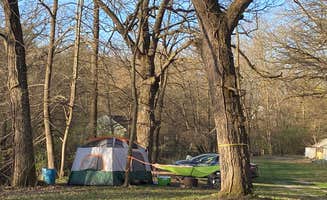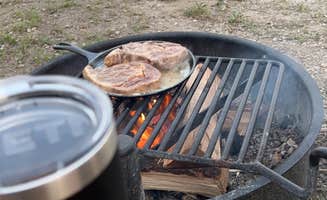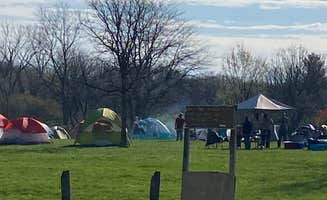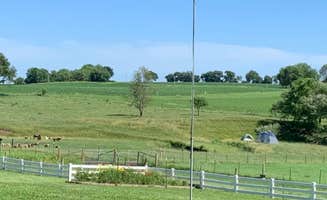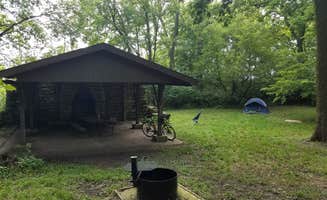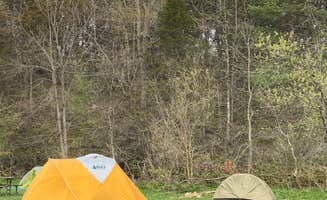Tent camping near Nachusa, Illinois offers proximity to the Kish River watershed, where elevations range from 700-850 feet above sea level. Weather conditions vary dramatically by season, with summer highs typically in the mid-80s and winter camping requiring preparation for temperatures that regularly drop below freezing. First-come, first-served camping predominates throughout the region, with most sites requiring self-registration and payment at honor boxes.
What to do
Kayaking the Rock River: At Castle Rock State Park, visitors can paddle downstream to reach secluded campsites. "It was a couple hour paddle, plus we made a pit stop at the castle rock overlook, before we got to the canoe in site," notes Kaitlin B., who recommends renting from White Pelican if you don't have your own equipment.
Equestrian camping and trails: Franklin Creek State Natural Area provides specialized facilities for horse owners. "If you need a post to tie up your horse, a round-about where they can go for countless circle walks along with plenty of hay to keep them fed, then this location might just be ideal for you," says Stuart K. The park maintains 12 miles of horse-friendly trails through varying terrain.
Explore canal history: The Hennepin Canal system offers multiple primitive camping locations along a historic waterway. Rangers make occasional rounds to collect the $8 nightly fee, though visits can be sporadic. "If you are looking for some good challenging currents to get some excellent oar-rowing in, you will struggle to find that here, so I highly recommend towing your watercraft over to the banks of the Rock River," advises a reviewer.
What campers like
Wide separation between sites: Campers consistently mention site spacing as a key advantage at MacQueen Forest Preserve. "This is one of those places that's so awesome, you really don't want to tell people about it. There are eight primitive campsites here, and they're spread out at least 50 yards apart. That's right, at least 50 yards," reports Amy G., who paid $4 per night for her stay.
Wildlife viewing opportunities: Waterfront sites provide excellent nature watching. "In the morning, the river was bustling with sounds from kingfishers, herons, and flycatchers," writes a reviewer about their riverside camping experience. The quiet environment at many sites allows campers to observe deer, beavers, and various bird species.
Value pricing: Most primitive sites in the region charge minimal fees. At MacQueen Forest Preserve, Marcus D. notes, "I will definitely be going back this year especially since it's close to me and it's only $5/night." Similar affordability exists at other locations, with Hennepin Canal campgrounds charging $8 regardless of camping mode.
What you should know
Accessibility challenges: Many sites require walking gear in from parking areas. "You do have to walk into all of them, but they do have one wagon and a dolly you can use to tote things in," notes a MacQueen Forest Preserve reviewer. Several locations offer no vehicle access whatsoever.
Limited drinking water: Most primitive campsites lack potable water. "There is no potable drinking water anywhere at any of these locks up and down the Hennepin Canal apart from at the Visitors Center, so ensure you bring your own water or a filtration system," advises a camper at Hennepin Canal Lock 11.
Train noise: Several campgrounds experience railroad disruptions. "If you cannot sleep to the sound of trains at night, this is not the campground for you. I don't mind them at all, and rather enjoy the sound, but there were probably three of them that went by in the middle of the night rather close to the campground," reports Amy G.
Tips for camping with families
Check bathroom facilities: Vault toilet conditions vary widely across locations. At Kayak Starved Rock Campground, Paul R. was surprised by the cleanliness: "The Porta potties were shockingly clean! The potties also have motion sensor lights in them for at night visits. They also have wipes, spray underarm deodorant, hand sanitizer and automatic air freshener."
Consider group sites: Some preserves offer dedicated areas for larger family gatherings. "There's also a giant fire pit with benches. The perfect area for a small group camp," notes a reviewer about the meadow area at MacQueen Forest Preserve.
Prepare for exposure: Many sites offer limited privacy or shelter. "The campsites are all on grassy areas with trees at the edges. This gives you some shade depending on the time of day," explains Art S. about Hennepin Canal Lock 21 Campground, noting that while sites are visible to others, adequate spacing typically exists.
Tips from RVers
Limited RV options: Most primitive camping in the Nachusa area excludes RVs entirely. At Lutheran Outdoor Ministries Center, Marisa A. mentions, "This is a Lutheran kids camp that offers a place for families to come and camp. Sometimes there are family retreats planned where you can bring your tent or trailer and camp in designated campsites in a tranquil meadow."
Size restrictions: When RVs are permitted, they're typically limited to smaller models. "No hook-ups, just grass with a fire pit and table. Water available a couple of places along the canal," reports Jeff and Linda L. about their experience, adding "We saw a class A, so they do fit."
Consider seasonal timing: Off-peak seasons offer better availability for limited RV sites. "This small campground has separate space for equestrian campers and those without horses," explains a reviewer, suggesting that scheduling around horse-focused events may yield better access for RVers seeking primitive camping opportunities.



